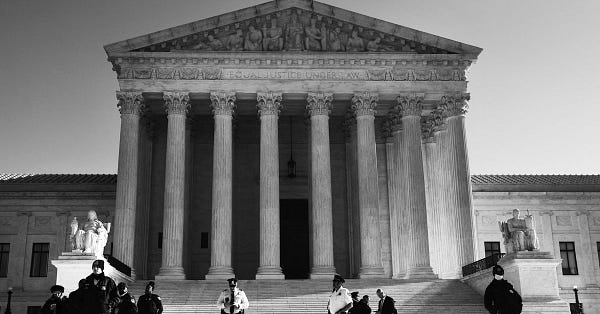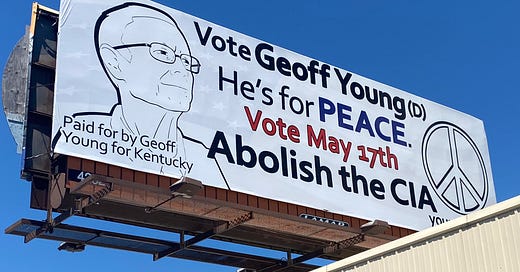Sixth Congressional District Primary Interviews: Geoff Young
Part three of our four-piece series getting to know the Democratic candidates hoping to unseat Rep. Andy Barr.
While I was inching my way down New Circle Road in Lexington earlier this year, I noticed something unexpected towering over the right side of the road, peeking out between a red neon “BEER” sign and a glossy billboard for a funeral home. Surely I’m seeing things, I thought, blinking a few times, billboards around here are typically reserved for car dealerships hocking obnoxiously-large trucks and realtors with terrifyingly white teeth. But as my car creeped closer, yes, my eyes did not deceive me: It was a billboard with a giant peace sign on it.
The illustrated, eye-catching-in-its-simplicity advertisement turned out to be in support of Democratic candidate for the Sixth Congressional District Geoff Young, who is running for the fifth time to have the opportunity to attempt and unseat Republican Rep. Andy Barr.
“I’m hoping, after all these years, I have some name recognition now,” he told me, chuckling.
Learn more about Young below in part one of our interview, and if you missed it, backtrack to read our two-part interview with Young’s Democratic primary challenger, Chris Preece, here and here.
Ahem, don’t forget: May 17 is primary election day! Tell your birding group! Remind people in the freezer aisle!
Sarah Baird: Is running for public office something that was always a personal aspiration? How did you get involved?
Geoff Young: I first ran for public office in 2012. I had retired after 15 years working in Frankfort at the state energy office: every state has one and their mission is to encourage energy efficiency and renewable energy technologies in Kentucky. So, when I retired from there, I decided that I could do a much better job than my representative at the time, Stan Lee, so I ran against him. I was in the Green Party at that time, and he was a very conservative Republican, basically a fundamentalist Christian representative, so he just voted the way you would expect that kind of representative to vote in Frankfort.
There was no Democrat running, but I was a Green and there was an Independent. Stan Lee never debated us, never interacted with us in any way—and he easily won reelection in 2012. Then in 2014, I wanted to run against Andy Barr for the U.S. House for pretty much the same reason. I thought he was doing a lot of damage to America and Kentucky and I thought I could do a much better job in Washington than he could. That's my basic reason. He’s extremely conservative—very pro-war—and my whole life I've been dedicated to ending our wars and making peace with all other countries.
SB: Is your position on peace something that stems from your upbringing?
GY: Yeah. At around the age of 12, I read Gandhi's autobiography and I was inspired by his use of nonviolent methods such as marches and publications, newsletters, sit-ins, nonviolent demonstrations, and every kind of nonviolent method you can imagine in order to gain independence for India from the British Empire. I was inspired by the fact that he didn’t use weapons and yet eventually, in the end, India got its independence. And so then about 1973, I read a couple of books by Noam Chomsky about the war in Vietnam, and I decided that I would like to go to MIT and take a class or two from him and read everything he wrote on politics, not on linguistics, and just become a peace activist. And I have been ever since. That's about 45 years I've been a part-time participant in the peace movement in this country. I’m originally from Massachusetts, but I moved to Kentucky—Fayette County—in 1982, so that's 40 years ago. More than half my life.
SB: As someone who has worked in peace activism in Kentucky for a long time, how do you think the state has shifted in terms of embracing or not embracing activism?
GY: Well, there are a lot of great grassroots activist organizations in Kentucky, like Kentuckians for the Commonwealth, and there are a lot of environmental organizations like the Kentucky Conservation Committee. There are all kinds of groups you can join. And so I think that's how change occurs: people get together and educate and agitate for necessary changes.
SB: What are your thoughts on money in politics and how to level the playing field therein?
GY: Well, I've never been very good at raising money for campaigns. I ran against Andy Barr in 2014, 2016, 2018, 2020, and this year, so every two years, and I've never been able to get through the primary. And I guess the reason is usually lack of funds, but other countries have solved that problem. They have shorter election seasons; they have public financing; they have requirements for media companies including public media to provide debates and opportunities to get your platform out there. And so, basically, I think we should follow the example of other countries and get big money totally out of politics.
SB: I've seen your billboard many times on New Circle Road in Lexington and it says one of your platform pieces is to abolish the CIA. Why is that important to you?
GY: Well, [the CIA] was formed in 1947, two years after World War II ended. And it has always been a tool of US imperialism. Its purpose was to kind of be...well, two purposes. One was supposedly to gather intelligence about other countries and do things to fight against spies from other countries, especially the Soviet Union and then later China in 1949 when China had its revolution and became a socialist country. So, it was to fight those enemy spies.
But it had a couple of other purposes, too. It quickly started engaging in overthrowing other governments that were not really aligned with the US. For example, in 1953, Iran had a moderate, democratically-elected president and the CIA and the British [Secret Intelligence Service] got him overthrown and replaced by a dictator, the Shah of Iran, who ruled Iran for several decades after that. He set up torture chambers, and the CIA trained his people how to torture people. And it’s been like that all over the world. Dozens of countries the CIA has made more dictatorial and tyrannical as long as they were allies of the US. And so really the CIA, since it was started, has been the worst terrorist organization in the world.
SB: How do Americans—and Kentuckians, specifically—respond to the concept of having a more peaceful world? Do you think people have trouble even envisioning that?
GY: Well, the problem, I think, is that people have been conditioned to think that things can't be different from the way they are. They kind of assume that, well, Russia has always been our enemy and now China has come along and they're our enemy, too…but all that is not set in stone. It didn't have to be that way. If the United States were to stop trying to overthrow other governments; closed our foreign bases; brought our troops home in order to do what they’re supposed to do under the constitution—which is to defend the United States against being invaded—then we would be able to interact with the rest of the world on a more equal basis. We wouldn't have to be the boss all the time and other countries would interact with us in a much more friendly way.
And we have created our own problems in foreign policy by being so hostile, aggressive [and] violent. For example, the war in Iraq in 2003. We invaded Iraq, conquered the country, occupied it, found Saddam Hussein and had him murdered. And that has caused most of the people in the Middle East to hate America. They’re not envious of our freedom. They hate the fact that we go in and conquer their country and drone bomb their citizens. People don’t like being killed and occupied and conquered and dominated, and the whole world is getting tired of that behavior. So if we were to change all of our foreign policies by 180 degrees, we would be much better liked in the world and the entire world would be more peaceful.
SB: If you were elected, how would you first approach helping day-to-day Kentuckians? What's step one for that?
GY: Step one is cutting the defense budget. More than half of all discretionary spending every year is wasted, in my opinion. Just plain waste. If we could redirect 70 percent of that budget to rebuilding our country; building our infrastructure; offering healthcare for all; canceling student debt; and developing high speed rail like China has…all kinds of things could be done if we didn't waste our money on wars and weapons.
To Be Continued…
This interview has been lightly edited and condensed.
We’ll be back tomorrow with the second installment of Geoff’s interview a mere week-and-a-day out from the primary.
In the meantime, it’s Mother’s Day, which means it’s a great time to support the phenomenal work that Kentucky Health Justice Network has been doing to protect bodily autonomy in our state for years and years. Local abortion funds need whatever you can give right now much more than those behemoth national nonprofits. Keep it close to home.


And a very (very!) important reminder for everyone from Rep. Attica Scott in light of the fact that we just experienced 8 days without access to legal abortion here in the state:





